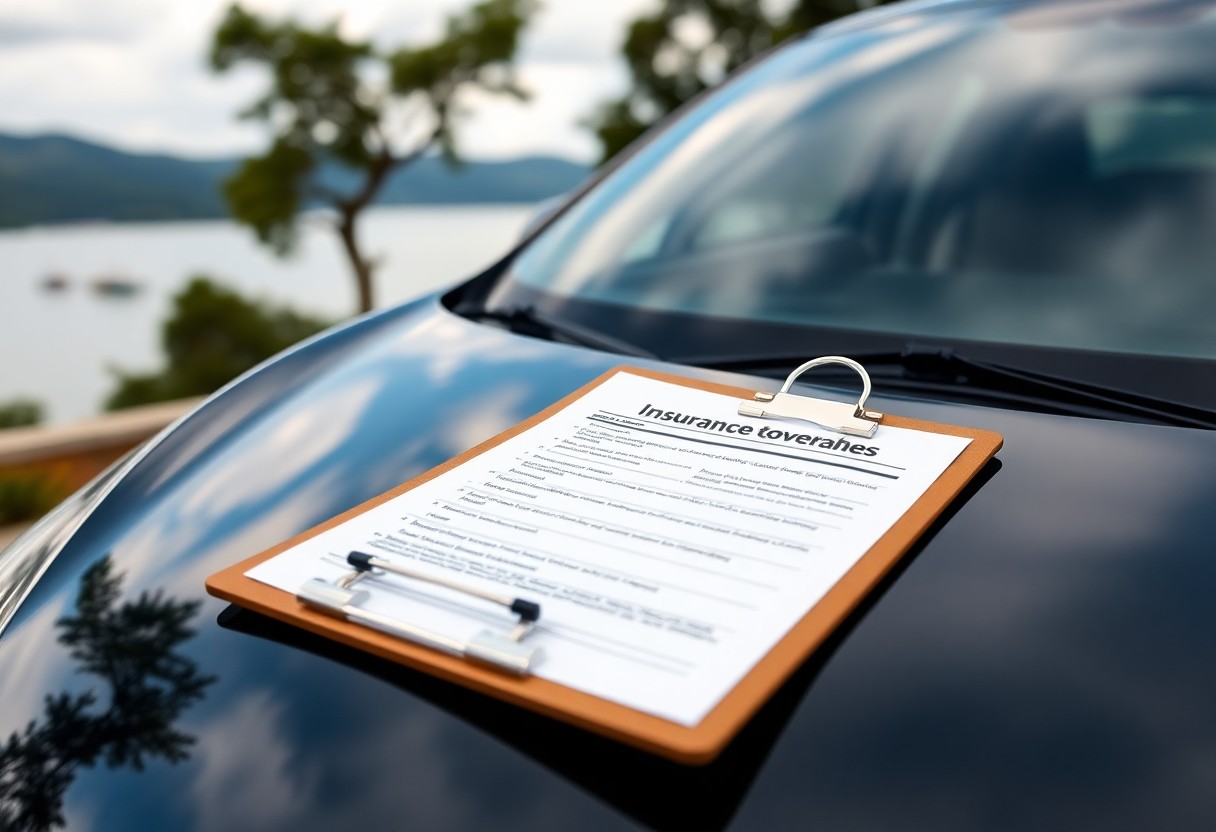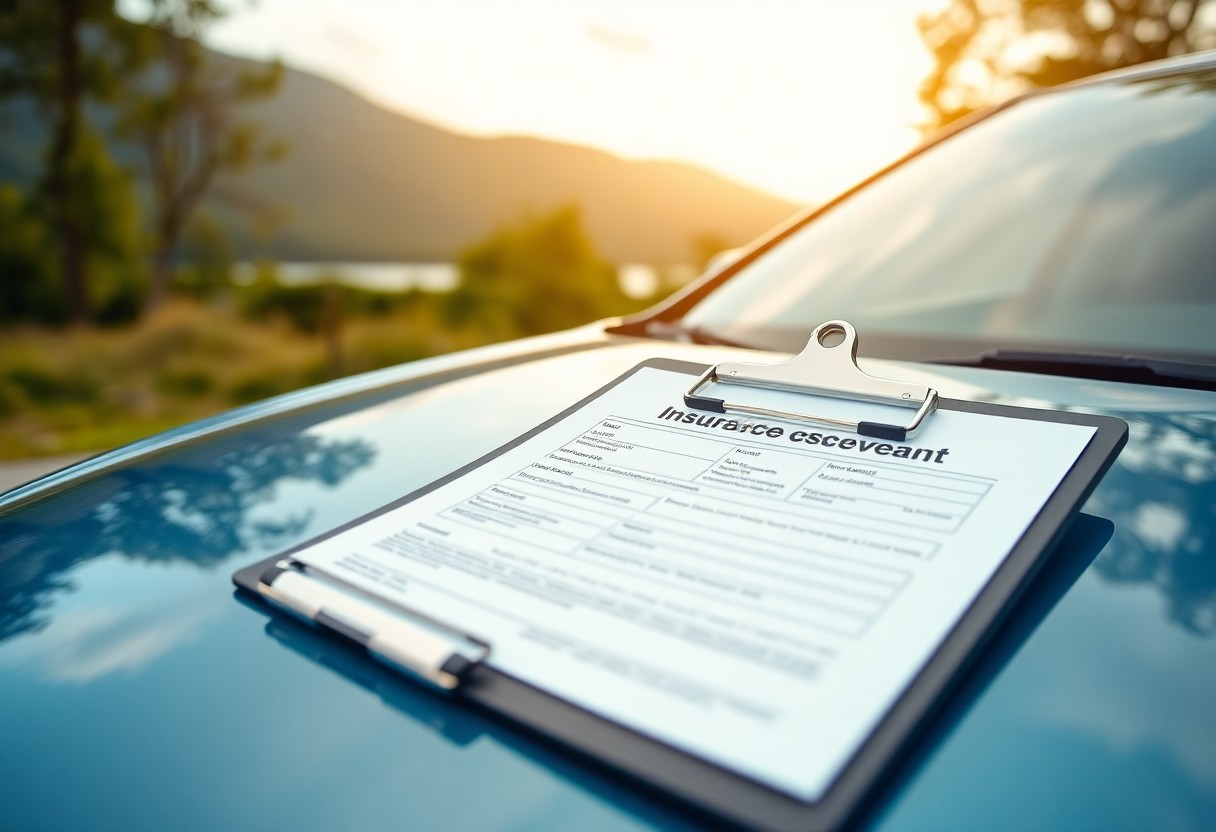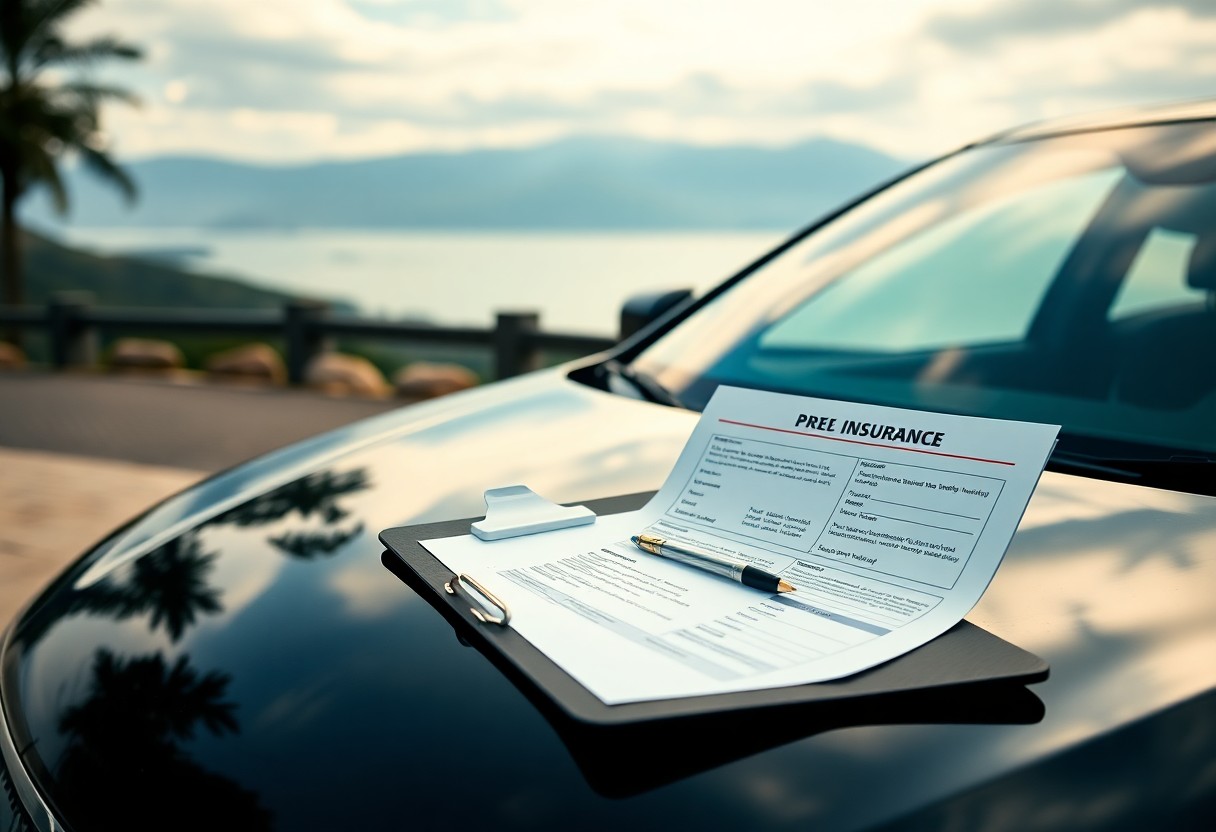Understanding rental car coverage is essential for effectively managing your travel expenses and guaranteeing a hassle-free journey. While your current auto insurance policy might provide coverage for rental cars, it is crucial to comprehend the specific details involved. When you rent a vehicle, your personal auto insurance could extend to offer collision, comprehensive, and liability coverage, which can significantly reduce the additional costs for insurance from the rental company. However, reviewing your policy limits is imperative, as any coverage gaps can leave you financially vulnerable. To protect yourself adequately, ensure you inquire about your coverage specifics with your insurance provider before your next rental, confirming you are covered for both the rental car and any potential liability matters.

Discovering the Details of Your Primary Insurance Coverage for Rental Cars
Although your personal auto insurance might extend coverage to rental vehicles, the limits and types of coverage can vary widely from one policy to another. Typically, standard insurance policies include liability, collision, and comprehensive coverage, which provide protection while driving a rental car. However, it’s important to recognize that specific exclusions may exist, which could impact your coverage in critical situations. Therefore, it’s advisable to thoroughly familiarize yourself with the specifics of your insurance policy to ensure you have comprehensive protection throughout your rental experience.
A Comprehensive Overview of Standard Car Insurance Policies
To ensure you are sufficiently protected, standard auto insurance policies encompass several essential components that every driver should be aware of. Generally, your policy will provide liability coverage up to $100,000 for injuries per person and $300,000 per accident. In addition, you may have options for collision, comprehensive, and personal injury protection. Each of these elements serves to address various aspects of your insurance needs, guaranteeing that you can drive with confidence, whether you are in your own vehicle or a rental car.
Essentials of Rental Car Coverage: What You Need to Know
When you decide to rent a car, it's generally understood that your personal auto insurance policy will take care of collision and comprehensive damages to the rented vehicle. This existing policy can provide savings of $20 to $30 daily on the insurance fees charged by the rental company. However, it's crucial to remember that higher deductibles may apply when utilizing your personal insurance for rental vehicles, potentially leading to out-of-pocket expenses should you need to file a claim.
Moreover, it’s vital to familiarize yourself with the fundamental aspects of rental car coverage, including the limits associated with the policy and the duration of coverage. Most insurance policies typically extend coverage for rental vehicles for a period of up to 30 days within the United States and Canada, offering protection against theft, vandalism, and damage caused by adverse weather conditions. However, do take note that certain vehicle types or uses may be excluded from this coverage.
Examining the Various Types of Rental Car Insurance Available
When renting a vehicle, it is essential to explore the various insurance options that are accessible to you, as they provide different forms of protection for both you and the rented vehicle. The main types of coverage include liability coverage, collision damage waiver, personal accident insurance, and personal effects coverage. Understanding these distinctions is vital for making informed decisions about your rental car insurance, ensuring that you have comprehensive protection tailored to meet your specific travel requirements.
| Insurance Type | Coverage Details |
|---|---|
| Liability Coverage | Protects against damage to others |
| Collision Damage Waiver | Covers rental car damage |
| Personal Accident Insurance | Medical expenses coverage |
| Personal Effects Coverage | Protection for belongings |
| Roadside Assistance | Emergency help services |
Understanding Liability Coverage Options for Rental Vehicles
Among the various insurance options, liability coverage is critical as it acts as your first line of defense against third-party claims in the event of an accident. You can either select the liability coverage included in your existing auto insurance policy or opt for the rental company's supplemental liability insurance (SLI), which can provide enhanced protection of up to $1 million, depending on your individual needs.
Delving into Collision and Comprehensive Protection for Rental Cars
When considering practical aspects, collision and comprehensive protection are essential for safeguarding your rental vehicle against physical damage resulting from accidents, theft, vandalism, and natural disasters. Your personal auto insurance may extend these critical coverages to the car you rent, giving you peace of mind during your travels.
Indeed, collision and comprehensive protection provides complete coverage for your rented vehicle. This includes safeguarding against hit-and-run incidents, falling objects, and damages due to severe weather conditions. While your deductible usually applies to claims, you can avoid this outlay by opting for a collision damage waiver from the rental company, which can simplify the claims process considerably.

Exploring Additional Insurance Options for Rental Cars
There are numerous supplementary insurance options you can consider adding to your rental car coverage for enhanced protection. These options typically encompass personal injury protection, medical payments coverage, and roadside assistance, each designed to address specific needs that can fill significant gaps in your existing policy.
Understanding the Benefits of Personal Injury Protection
This type of coverage extends to include medical expenses, lost wages, and essential services, irrespective of who is deemed at fault in the accident. Typically, this insurance covers up to 80% of medical expenses and can apply to you, your passengers, and even pedestrians involved in the incident. Generally, your coverage limits will range from $10,000 to $50,000, providing a safety net for unexpected medical costs.
Insights on Medical Payments Coverage and Its Importance
In many states, this coverage is specifically designed to assist with medical bills for you and your passengers following an accident, regardless of fault. It typically covers immediate medical expenses, hospital visits, and emergency services that may arise after an incident.
With Medical Payments Coverage, you benefit from direct payments for medical expenses without the delay of waiting for fault determination, which can be incredibly beneficial during urgent situations. This type of coverage can assist in offsetting your health insurance deductible and generally offers limits ranging from $1,000 to $25,000. The flexibility to utilize this coverage even if you have health insurance makes it an invaluable addition to your rental car protection strategy.
Specialized Insurance Options for Rental Vehicles
To ensure you have comprehensive protection while renting a car, it's crucial to understand the specialized coverage options available. These insurance products are particularly designed to address specific coverage gaps and provide enhanced protection beyond your standard auto policy. Your options may include collision damage waivers, personal accident insurance, and personal effects coverage, each serving a distinct purpose in your overall rental protection plan.
An In-Depth Look at Collision Damage Waiver
A Collision Damage Waiver (CDW) offers you comprehensive protection against damage to your rental vehicle. This option effectively eliminates your financial responsibility if the rental car is damaged or stolen. While your personal auto insurance may cover certain damages, selecting CDW provides zero-deductible coverage and avoids claims on your personal policy, which could potentially lead to increased premiums.
Recognizing the Importance of Personal Accident Insurance
In addition to vehicle protection, Personal Accident Insurance is essential as it covers medical expenses for you and your passengers in the event of an accident during your rental period. This coverage can offer up to $250,000 in accidental death benefits and may effectively supplement your existing health insurance coverage.
Moreover, Personal Accident Insurance can include coverage for ambulance expenses, emergency medical evacuation, and daily hospital benefits. Since your standard auto insurance might not cover these specific medical costs, this additional coverage can be invaluable for your rental car protection strategy. Importantly, this coverage applies regardless of who is at fault in an accident.
Considerations for Protecting Your Personal Property During Rentals
Even if you possess car insurance, it is vital to recognize that your personal belongings in a rental car may not be fully protected. Typically, your standard auto insurance will provide limited coverage for personal items, which may lead to potential losses during your travels. Understanding the extent of your belongings' protection allows for informed decision-making regarding any additional coverage needs.
Understanding Personal Effects Coverage and Its Benefits
Approximately 80% of rental car companies offer Personal Effects Coverage, which protects your belongings for amounts ranging from $500 to $1,500. This coverage applies to personal items such as laptops, phones, cameras, and luggage in the event of theft or damage. Additionally, your homeowner's or renter's insurance may provide further protection for your personal belongings while traveling, creating an added layer of security during your trip.
Recognizing Limitations of Coverage for Personal Effects
Personal Effects Coverage does come with specific limitations that you should be aware of. Most policies exclude certain high-value items, such as jewelry, cash, and business equipment, meaning you might not be fully covered for these valuable items. Furthermore, your coverage may include a per-item limit and a deductible that you must satisfy before the insurance compensates for any losses.
With standard personal effects coverage, you might encounter restrictions on claim amounts and the types of items covered. Typically, this coverage is only valid during the rental period and while the items are in the rental vehicle. You'll need to provide proof of ownership and value for any claimed items, and some policies may require a police report for theft claims to ensure proper documentation.

Emergency Services in Rental Car Insurance: What You Should Know
It’s essential to note that not all rental car insurance policies include emergency assistance coverage. While your personal auto insurance may offer these services, the coverage limits and availability can vary widely. Before declining coverage from the rental company, check if your policy includes 24/7 emergency support, towing services, and lockout assistance to ensure you are adequately protected in an emergency situation.
Exploring Roadside Assistance Options for Peace of Mind
Before heading out on your journey, be sure to verify the specifics of your roadside assistance coverage. Typical services often encompass battery jump-starts, tire changes, fuel delivery, and towing. You can obtain this coverage through your personal auto insurance, benefits associated with your credit card, or by purchasing it as part of the rental company’s offerings, which generally costs between $5 and $15 per rental day.
Understanding the Limitations of Roadside Assistance Services
Before relying on roadside assistance coverage, it’s crucial to be aware of its limitations. Most policies impose specific mileage restrictions for towing and may not cover all geographical locations. Additionally, your coverage might exclude off-road incidents or service in remote areas, potentially leaving you unsupported in certain situations.
A typical roadside assistance plan will include limits on the number of service calls you can make each year and the maximum coverage amounts available. You may encounter additional charges beyond the established limits, and some services might necessitate out-of-pocket payment with later reimbursement. It is also essential to recognize that response times can vary based on your geographic location and current weather conditions.
Making Smart Choices About Your Rental Car Insurance
Reflecting on your car insurance coverage for rental vehicles, it becomes evident that the specific terms of your policy play a vital role in determining your protection. It is crucial to thoroughly review your policy details and consult with your insurance provider to understand your exact coverage limits. Generally, your personal auto insurance may cover collision, liability, and comprehensive protection for rental cars, but gaps can still exist. Additionally, consider the benefits offered by your credit card and any existing coverage before opting for additional rental car insurance. If you identify any coverage gaps, purchasing supplemental insurance from the rental agency can ensure full protection for your rental experience. This knowledge empowers you to make informed insurance decisions for your next car rental, ultimately leading to a worry-free travel experience.
Addressing Common Questions About Rental Car Insurance Coverage
Q: Does my personal car insurance provide automatic coverage for rental vehicles?
A: In most cases, personal car insurance policies do extend coverage to rental cars rented within the United States. Your collision and comprehensive coverage generally applies to rental vehicles. However, the limits and terms from your personal policy directly transfer to the rental car. It’s always prudent to reach out to your insurance provider to confirm specific coverage details prior to renting.
Q: What potential gaps in rental car coverage could be present in my personal auto policy?
A: Your personal auto insurance may not cover various aspects, including loss of use fees charged by rental companies, diminished value claims, or administrative fees. If you are renting internationally, separate coverage is typically required. Furthermore, the use of rental cars for business purposes may also not be covered under personal policies. It’s essential to verify these specific areas with your insurance provider.
Q: Do credit cards offer coverage for rental vehicles?
A: Many credit cards provide rental car coverage when you pay for the rental using that card. Generally, this coverage is limited to collision damage only and serves as secondary insurance. The coverage activates after you decline the collision damage waiver offered by the rental company. Benefits can vary significantly based on the card issuer, so it's important to review your card’s specific coverage details.
Q: What insurance should I consider purchasing from the rental car company if my personal insurance already covers rentals?
A: If your personal policy has low liability limits, consider obtaining supplemental liability insurance. Additionally, a loss damage waiver (LDW) can be beneficial if you wish to avoid making a claim on your personal insurance. Personal effects coverage is also worth considering to protect your belongings in the rental car, especially if your homeowner's or renter's insurance does not provide adequate coverage.
Q: How does the deductible function when using personal insurance for rental cars?
A: Your personal auto insurance deductible will apply to any claims made for rental cars. For example, if you have a $500 deductible and damage the rental car, you will be responsible for paying the first $500 in repair costs. The insurance company will then cover the remaining expenses. This differs from rental company coverage, which often has no deductible but tends to be more expensive upfront.
The Article: Does your car insurance cover rental cars details on coverage and what to know appeared first on https://rentacar24.org/
The Article Car Insurance Coverage for Rental Cars: What You Need to Know Was Found On https://limitsofstrategy.com





Comments are closed